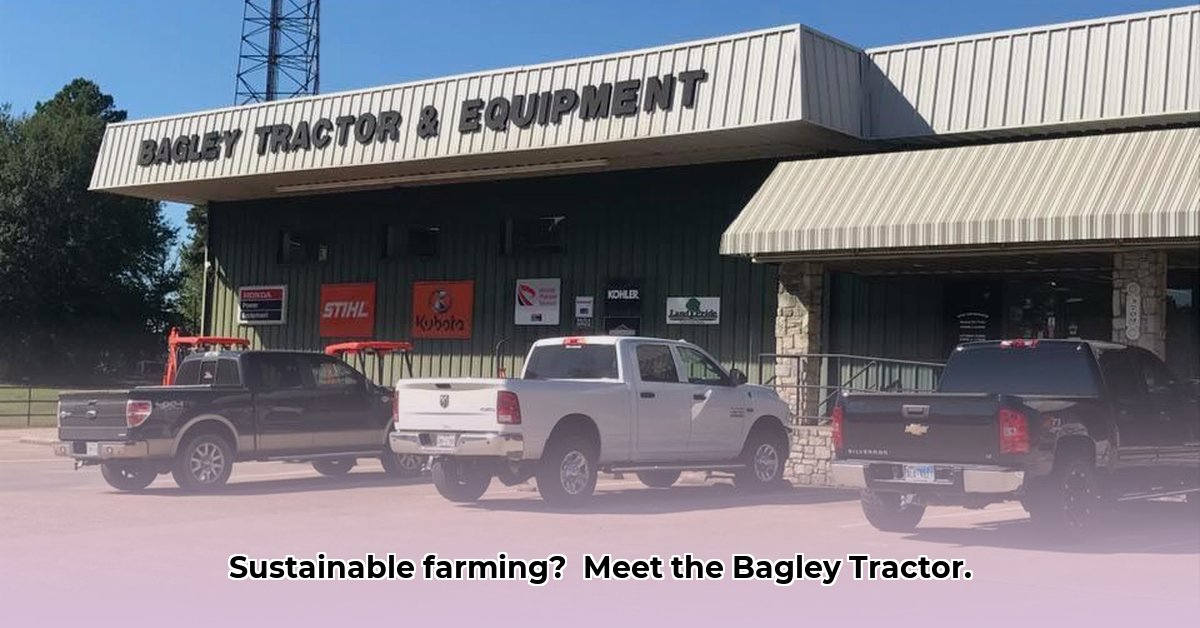
Bagley Tractor, a leading Kubota dealer in Longview, Texas, plays a crucial role in the local agricultural landscape. Their focus on Kubota tractors aligns with the increasing demand for sustainable farming practices, given Kubota's reputation for fuel-efficient machinery and advanced technology. This article explores Bagley's potential contribution to a greener future for East Texas farmers, examining both the capabilities of Kubota tractors and the need for enhanced transparency regarding Bagley's own sustainability initiatives.
Bagley's Role in Sustainable Agriculture: A Detailed Examination
Bagley Tractor's contribution to sustainable agriculture in East Texas is multifaceted. While their provision of Kubota equipment—renowned for efficiency and technological advancements—forms a significant part of this, a complete assessment requires examining both the equipment's capabilities and Bagley's internal operational practices. Simply offering fuel-efficient tractors is insufficient; understanding Bagley's commitment to broader sustainability initiatives is essential. This article will explore both aspects, highlighting areas requiring further investigation to ensure full transparency.
Kubota Tractors: Efficiency and Innovation for Sustainable Farming
Kubota tractors, the core of Bagley's offerings, are widely recognized for their fuel efficiency. Numerous farmers report substantial cost savings compared to alternative brands, a key benefit in sustainable agriculture. Reduced fuel consumption translates directly to lower greenhouse gas emissions, benefiting the environment significantly.
Beyond fuel efficiency, Kubota's precision farming technology represents a significant advancement. GPS-guided systems enable precise application of fertilizers, pesticides, and water, minimizing waste and protecting natural resources. This precision reduces the environmental footprint, for example, minimizing chemical runoff into waterways. However, initial investment costs and the learning curve associated with precision technology should be acknowledged.
| Kubota Tractor Feature | Sustainable Farming Benefit | Potential Drawbacks |
|---|---|---|
| High Fuel Efficiency | Lower operating costs, reduced greenhouse gas emissions. | Higher initial purchase cost compared to some competitors. |
| Precision Farming Technology | Optimized resource use (fertilizers, pesticides, water). | Requires technical expertise and upfront investment. |
| Durable Construction | Extended lifespan, reduced waste from frequent replacements. | Repair costs may be higher due to advanced technology. |
Isn't minimizing environmental impact while maximizing yields a key goal for every farmer? Kubota's technology directly addresses this challenge.
Actionable Steps for a More Sustainable Future
Achieving truly sustainable agriculture demands a collaborative effort. The following actionable steps outline pathways for improvement for farmers, Bagley Tractor, and other stakeholders.
For Farmers:
Compare Fuel Efficiency: Thoroughly compare Kubota tractors' fuel consumption against other brands, considering your farm's specifics. Use independent reviews and data from other farmers to inform your decision.
Implement Precision Technology: Explore and adopt precision farming technologies offered with Kubota tractors. While there's a learning curve and upfront investment, the long-term benefits in reduced resource use and environmental protection are substantial.
Conduct a Comprehensive Cost-Benefit Analysis: Consider the full lifecycle cost of equipment. This includes initial purchase price, fuel costs, maintenance, repairs, and potential resale value. This holistic approach reveals the true economic and environmental sustainability of your choices.
For Bagley Tractor:
Transparency is Paramount: Publish a detailed, independently verified sustainability report outlining your goals, metrics, and progress. Openly address challenges and areas needing improvement. This fosters trust within the community.
Implement a Sustainability Audit: Conduct a thorough review of your business operations, pinpointing areas for improvement in sustainability across all aspects, from reducing waste to energy efficiency.
Collaborate and Engage: Partner with East Texas organizations focused on sustainable agricultural practices. Participate in education initiatives and community outreach to promote environmentally responsible farming.
For Stakeholders (Government, Consumers, Researchers):
Incentivize Sustainable Practices: Advocate for policies like tax incentives or grants promoting sustainable farming technologies.
Invest in Research and Development: Fund research into more sustainable agricultural machinery, exploring alternative fuels and efficiency improvements.
Demand Accountability: Consumers and the agricultural community should demand transparency regarding sustainability efforts from all businesses in the sector. This collective pressure will drive widespread improvement.
Conclusion: A Shared Responsibility
Bagley Tractor holds a substantial role in fostering sustainable agriculture in the East Texas region. By actively working toward enhancing their sustainability practices and collaborating closely with farmers and other stakeholders, Bagley can significantly contribute to a greener, more environmentally responsible agricultural future. This requires ongoing commitment to transparency and a collaborative approach from all involved. Let’s work together to make East Texas farming more sustainable, one Kubota tractor at a time.